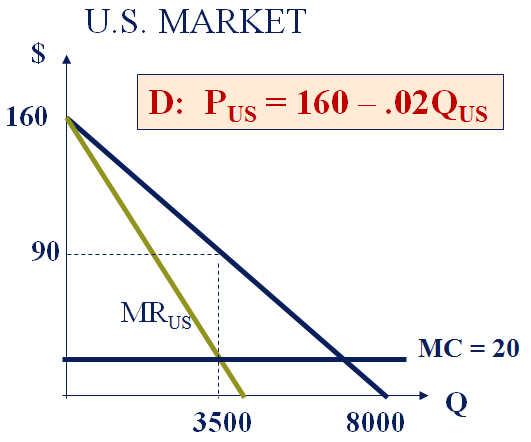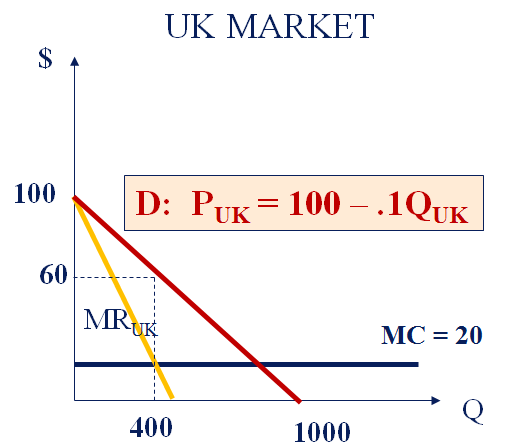Applied
Microeconomics
Lecture 22
BE 300
Plan for Today
Case
Finish price discirmination
Multi-part pricing
Coming Up
"Bundles of Joy" Case Due Next Week
Textbook reading 10.5-10.7
Scholarly Communication
Application to Academic Journal Pricing
•Prices for the Royal Economic Society’s Economic Journal:

Scholarly Communication
•MCs of printing and delivering the journal to a subscriber are $20/year, whether the subscription is sent to the U.S. or UK
•The fixed costs of soliciting, editing and typesetting articles for the journal are $260,000 annually; If the EJ shuts down temporarily, these fixed costs can be avoided
•What are the optimal prices in the United Kingdom & the United States (assuming monopoly), if the markets can be segmented?

Scholarly Communication
US demand:
UK demand:
Q1 & Q2: Draw and label the (linear) UK and U.S. demand curves. Calculate the profit maximizing price and quantity of subscriptions for the United Kingdom, and indicate each on the appropriate graph. Do the same for the United States.
Scholarly Communication
If you can segment: Set MC = MR in both markets (one at a time)

Marginal Revenue--demand curve + twice the slope. So in the US:
160-0.04Q=20
Q=3500, P=90
Scholarly Communication
If you can segment: Set MC = MR in both markets (one at a time)
In the UK--
MR=100-0.2Q = 20
Q=400, P=60
Given the price in the US is so much higher, can't RES increase profits by re-allocating some of its sales to the US from the UK?

Scholarly Communication
Calculate total profits:
Costs
Fixed Cost = 260,000/year
MC = AVC = 20
TC = 260,000 + 20(3500 + 400) = $338,000
Revenue
TR = PUS x QUS + PUK x QUK
= 90 x 3500 + 60 x 400 = $339,000
Profit = 339,000 – 338,000 = $1,000
Scholarly Communication
What if RES was not allowed to price discriminate?
•If the RES were forced to charge the same price to all subscribers, the profit maximizing price per subscription would be $85.00.
•If $85 is the best single price the RES can get for its journal, what level of output should the RES plan for next year?
US demand: QUS = 8000 – 50PUS (or, PUS = 160 – 0.02QUS )
•UK demand: QUK = 1000 – 10PUK (or, PUK = 100 – 0.1QUK )
•How much could RES sell at P = 85?
~QUS = 8000 – 50 * (85) Þ QUS = 3750
~QUK = 1000 – 10 * (85) Þ QUK = 150
~Q = QUS + QUK = 3750 + 150 = 3900
Scholarly Communication
So, how much should RES sell if the maximum profit occurs at P=$85?
•Check profits:
~TR = 3900(85) = $331,500
~Per Unit Operating Costs = 20 * 3900 = 78,000
~Operating Profits = TR – VC = $253,500
~Next Year (when annual costs are not yet spent)?
–TC = 260,000 + 20 (3900) = $338,000
–Profit = TR – TC = – $6,500 => shut down
–Answer = RES should sell NO subscriptions at $85
•Eliminating differential pricing will leave readers worse off because the firm will shut down.
•RES would choose to produce zero (since the $260,000 is not sunk – it is avoidable cost).
Lecture 22
By umich
Lecture 22
- 764



